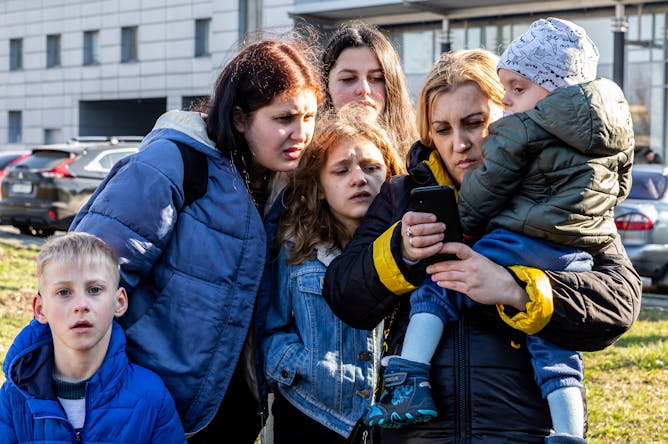|
In March, as the brutal Russian war against her country was killing citizens and destroying homes, hospitals and even entire towns, Yuliia Kabanets left Ukraine to meet her partner in Poland. She spent a week there.
Then she returned home.
“My own experience of being out of Ukraine for a week has shown me that I am not ready to not be in Ukraine now,” Kabanets writes. “I was told the same by many people: It is psychologically easier for them to be in Ukraine, even if nowhere is safe, even if their hometown is constantly under shelling from the Russian occupants.”
Migration scholar Karen Jacobsen of Tufts University’s Fletcher School writes today about Kabanets and the many other Ukrainians like her who don’t want to leave their country, despite the danger they face.
She says it’s a story repeated in other parts of the world where conflict rages, from Afghanistan to the Democratic Republic of the Congo. “Many people do not leave their home areas, despite great danger,” Jacobsen writes.
Also today:
|

Many Ukrainians returned home after fleeing the Russian invasion, including this family that arrived on April 12, 2022, in Lviv, Ukraine, from refuge in Poland.
Dominika Zarzycka/SOPA Images/LightRocket via Getty Images
Karen Jacobsen, Tufts University
A young woman in Lviv, Ukraine, writes about fleeing Russian aggression not once, but twice, since 2014 and explains the fierce desire to stay in her home country – a desire shared by many.
|
Health + Medicine
|
-
Patrick Jackson, University of Virginia
An infections disease doctor discusses the use, benefits and availability of a drug to prevent severe COVID-19.
-
Arash Javanbakht, Wayne State University
Images of war, violence, suffering and death can have a traumatic impact on those who view them.
-
Emily Belarmino, University of Vermont; Lauren A. Clay, University of Maryland, Baltimore County
Researchers find that households without enough diapers for their children are more likely to struggle with other hardships.
|
|
Politics + Society
|
-
Tatsiana Kulakevich, University of South Florida
Military tensions and political concern are heating up in Transnistria, a breakaway state of Moldova that borders Ukraine. An Eastern European expert answers four key questions about this region.
-
Kate Clifford Larson, Brandeis University
Harriet Tubman has long been known as a conductor on the Underground Railroad leading enslaved Black people to freedom. Less known is her role as a Union spy during the Civil War.
|
|
Education
|
-
Donald E. Heller, University of San Francisco
The Pell Grant would have to be doubled in order for its purchasing power to be anywhere near what it used to be, a scholar observes.
|
|
Ethics + Religion
|
-
Dimitris Xygalatas, University of Connecticut
Ukrainian families’ anguish at not being able to bury their loved ones underscores a deep human need, an anthropologist writes.
-
Laura E. Alexander, University of Nebraska Omaha; Jane Hong, Occidental College; Karen Hooge Michalka, University of Mary; Luis A. Romero, Texas Christian University
Four scholars of race, religion and immigration explain how US refugee and asylum policy has long been racially and religiously discriminatory in practice.
|
|